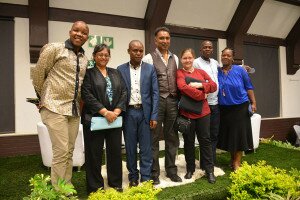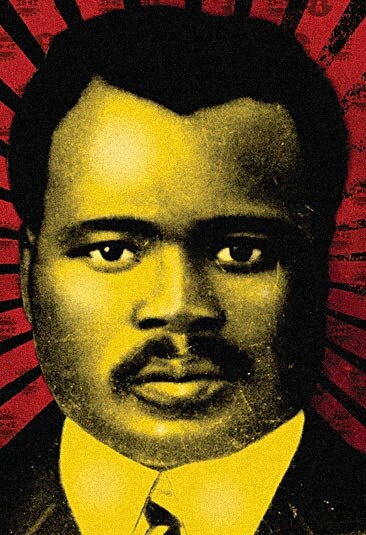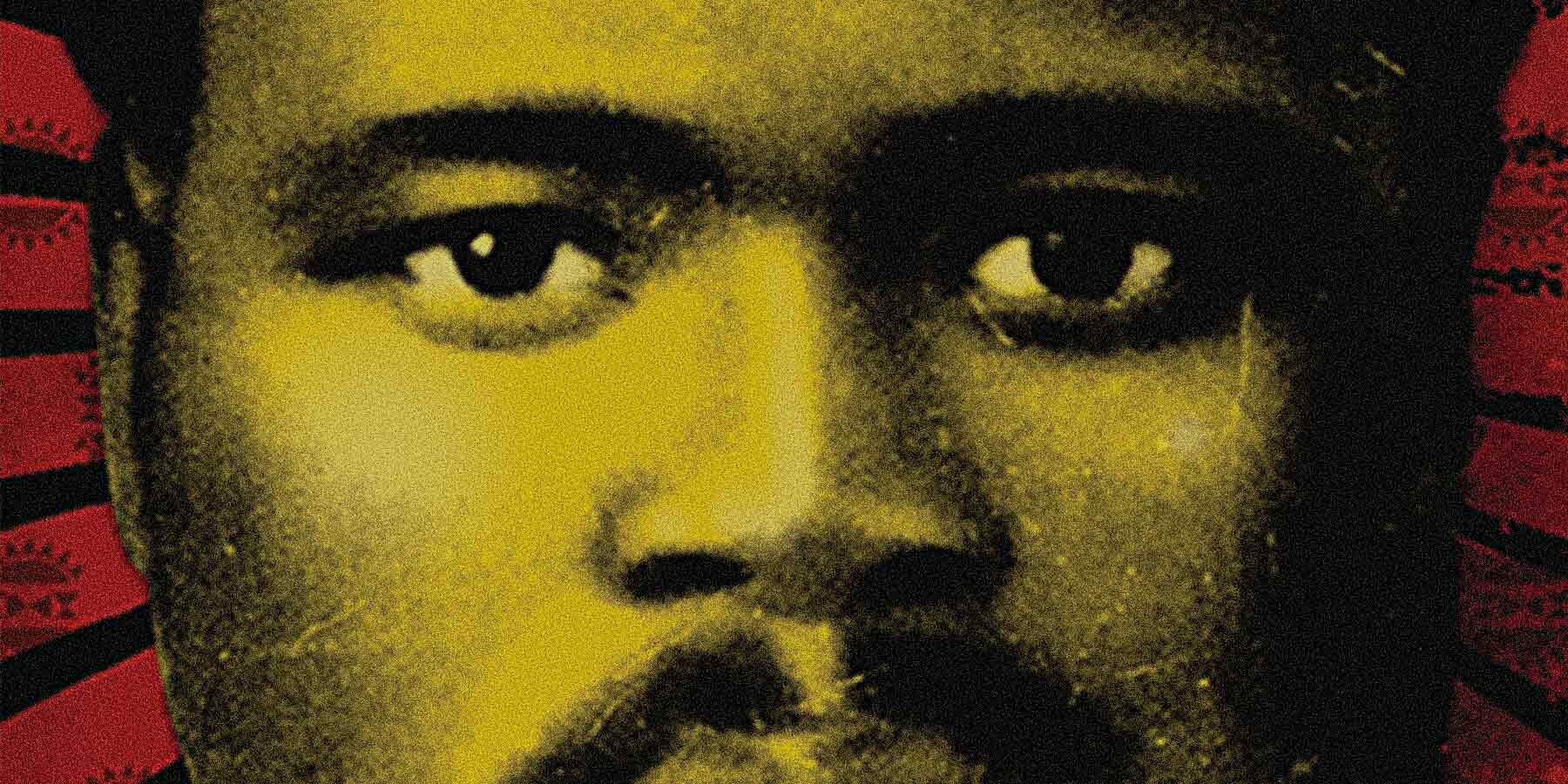The role of intellectuals and scholars in a democratic society

The 2016 J.T. Gumede lecture and dialogue panel, (l to r): Dr Siphamandla Zondi, Prof Quarrisha Abdool Karim, LHM Director Sinothi Thabethe, Dr Rama Naidu, Belinda Johnson, Dr Bheki Mngomezulu and Maypher Mngomezulu, LHM coordinator for the evening.
As part of its public engagement initiatives the Local History Museums of eThekwini Municipality hosts a series of seminars and lectures every year, and the first of these is the annual Josiah Tshangana Gumede Lecture & Dialogue, which took place on 4 February 2016 at the Natural Science Research Centre. This event is intended both to commemorate the socio-political activism of J.T. Gumede, and to challenge the role of Civil Society in contemporary discourse, demonstrating how Gumede’s philosophy of different people with different ideologies working together to address the plight of South African people is still relevant today. The lecture also celebrates J.T. Gumede’s social activism against the government and racist policies of the early 20th century, and serves to investigate aspects of social activism among 21st century Civil Society Organisations in the current political dispensation.
Josiah Tshangana Gumede is an epitome of a sincere and genuine socio-political activist whose vision was to see people from different ideological backgrounds working together towards a free democratic society. Born in 1867, he was one of the founding fathers of the ANC and became one of the first people who campaigned against the 1913 Natives Land Act. He was elected as ANC President between 1927 and 1930. J.T. Gumede is remembered in the political fraternity for his ideology of forging the nationalist – communist alliance in the fight against white domination. He did this through encouraging the ANC to have a closer working relationship with the Communist Party of South Africa. He advocated for this because he believed that the communists were sincere in addressing the plights of the colonized. Essentially, the current tripartite alliance between the ANC, COSATU and the SACP has its roots in J.T. Gumede’s call for tolerance of divergence views and a full grasp of the political dynamic of a multi-class national liberation movement.
Director of the Local History Museums, Mr Sinothi Thabethe filled the role of programme director, and opened proceedings by giving the stage to a representative of the Gumede family, Mrs Ntombilezi Ngqulunga. Reminiscing on the role of her illustrious grandfather and the important role he played in the history of South Africa, she provided a thought provoking introduction to the evening. The format of the Lecture and Dialogue is intended to facilitate a genuine and intimate interaction between the speakers and members of the audience, and a sharing of ideas as opposed to the delivery of speeches. Panellists are therefore seated comfortably on a low stage, while over 100 people in the audience gathered around tables in order to discuss the issues raised by the panel. In this arrangement the role of facilitator is crucial to the success of the evening, and Dr Rama Naidu did an excellent job of making sure that productive debate flowed through the hall during the course of the 3-hour long event.
Dr Rama Naidu is presently the executive director of the Democratic Development Programme, an NGO he founded which is dedicated to the promotion of active citizenship, good governance, social justice and a strong civil society in South Africa. Rama is an accomplished scholar and a past fellow at North-Western University in Chicago. He battles with providing a description of exactly what is that he does and like to best describe himself as a warrior for the transformational development of communities. These skills were put to use as he expertly steered proceedings in the J.T. Gumede Lecture and Dialogue.
The panellists who participated in the 2016 edition of the J.T. Gumede dialogue were Prof. Quarrisha Abdool Karim, an epidemiologist at CAPRISA and 2015 eThekwini Living Legend; Belinda Johnson of the International and Public Affairs cluster at the University of KwaZulu-Natal; Dr Bheki Mngomezulu, who is the current CEO of the Mzala Nxumalo Centre and also works as an independent political analyst for various TV and radio stations; and Dr Siphamandla Zondi, Head of the Institute for Global Dialogue, a think tank at UNISA.
Each panel member was allowed 10 minutes to offer their own interpretation of the topic, namely “what is the role of intellectuals and scholars in a democratic society.” As expected, each one of them gave a provocative and insightful perspective on how democracy depends on the active engagement of intellectuals, but all agreed that the term should not only be applied to writers and teachers who work in tertiary institutions. Considering the upheavals in academic life that have taken place over the course of the past year, it is not surprising that the panel took note of how the role of our universities are facing questions with regard to transformation and their function in a democratic society. It is increasingly urgent to find space for intellectual debates outside the so-called “ivory towers” of universities.
One of the novel and interesting elements of the presentations was how Dr. Rama Naidu concluded each panellists’ time with a short break during which the audience members were discussed a particular element of the discourse. This ensured that those present remained engaged with the content and triggered often animated conversations at the respective tables. At the end of all the panel presentations, Dr. Naidu opened the discussion to the floor and many of the debates then flowed back to the panel. As a way of summarising the whole event each member of the panel was asked to offer a practical way to improve the role of intellectuals in our democratic South African society.
Prof. Karim said that “as we are all part of same nation, we need to find common purpose and articulate more of what we want in our democracy.” According to Siphamandla Zondi, “the greatest ideas are not taught in classrooms, but arise from consciousness, and from learning about yourself.” He stated forcefully that “we should all quit idea that ‘intellectuals’ are out there, otherwise we are delegating difficult work. We will achieve a breakthrough when we break the colonial idea of hierarchy, instead of the indigenous notion of cycles.” Belinda Johnson said that her advice would be that “South Africans who love democracy should not wait passively to be led, but get involved in practical ways, even in small ways,” and “put ubuntu into practice” was her final recommendation. Bheki Mngomezulu completed the dialogue with a short pithy statement, in line with his views stated earlier in the evening, “it is not what you say or do, but how you do it,” he declared.
Dr. Rama Naidu concluded the panel by commending the audience and pointing out that an important first step in making a contribution is simply to come to a seminar such as this one. He said that “We all have something to contribute, and that no-one is coming to save us. South Africans should acknowledge we have contribution to make, even in conversation. Drive a different story, if you don’t write your story someone else will and we’ll say what is wrong from side-lines. This is not a group conversation, it is personal.”
On that fitting note Sinothi Thabethe thanked all involved for their contributions and invited everyone to enjoy the supper and entertainment provided as part of the J.T. Gumede Lecture & Dialogue.

Josiah Tshangana Gumede



